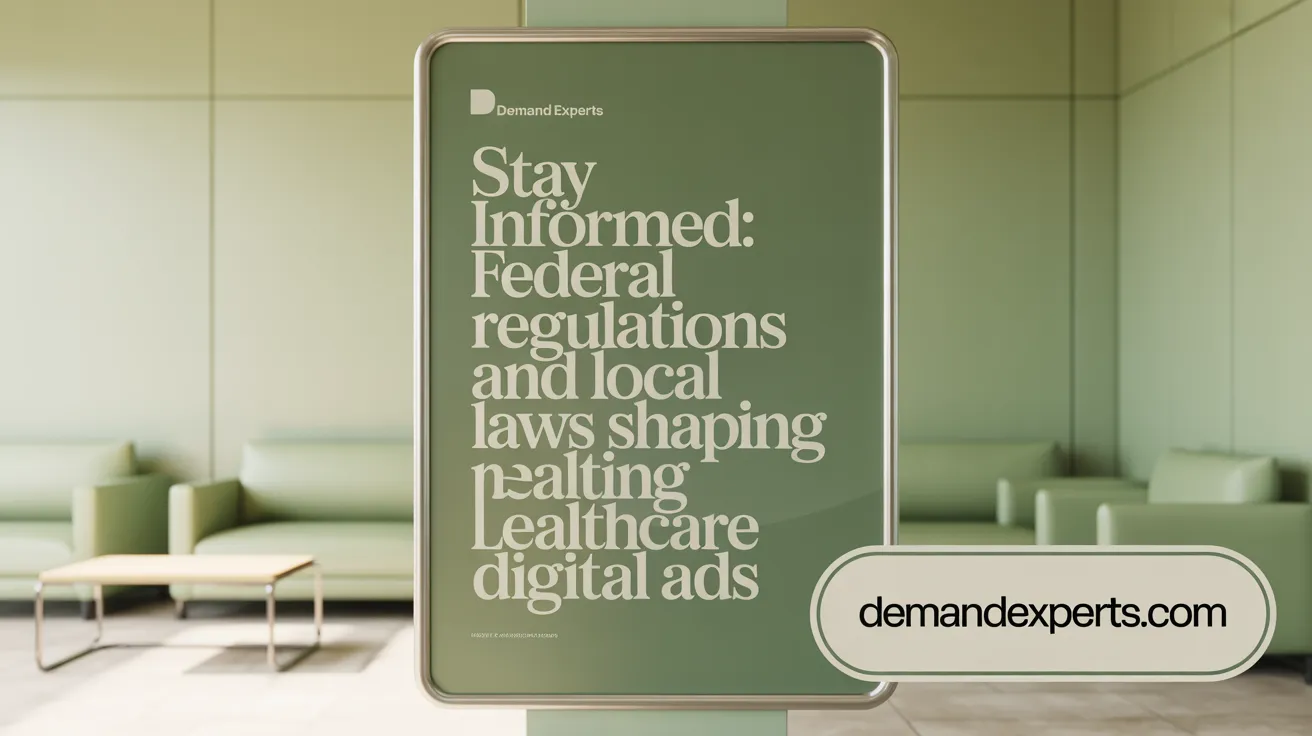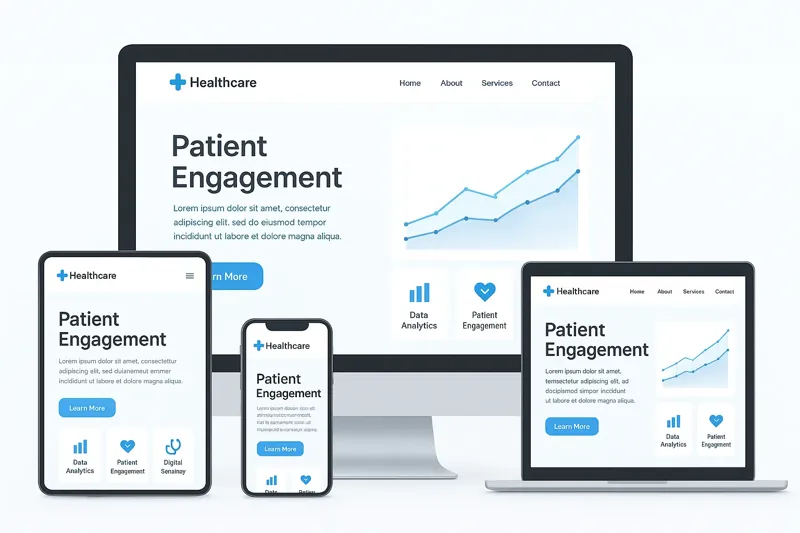Understanding Compliance in Healthcare Digital Advertising
Overview of Healthcare Digital Advertising Regulations
Healthcare digital advertising is governed by a complex framework of federal laws and regulatory agencies designed to ensure truthful, accurate, and non-misleading marketing practices. Advertisements must disclose risks and limitations clearly, especially when promoting prescription drugs, medical devices, or government-sponsored healthcare programs.
Importance of Compliance for Trust and Effectiveness
Maintaining compliance is critical not only for legal adherence but also to build and preserve patient trust. Transparent communication, truthful claims, and robust data privacy protections foster patient confidence, reduce skepticism, and enhance the overall marketing effectiveness of healthcare organizations.
Key Federal Regulatory Bodies and Laws
- Federal Trade Commission (FTC): Oversees truth-in-advertising standards, mandates honesty in endorsements, and prohibits misleading claims.
- Food and Drug Administration (FDA): Regulates advertisements for prescription drugs and medical devices, requiring accurate risk disclosure.
- Centers for Medicare and Medicaid Services (CMS): Ensures Medicare and Medicaid-related ads are truthful and disclose program limitations.
- HIPAA & GDPR: Protect patient data privacy, enforcing consent and security requirements for health information used in digital ads.
Adhering to these regulations and integrating them into digital advertising strategies strengthens compliance and ensures campaigns are both ethical and impactful.
Regulatory Landscape: Federal and State Requirements

Which federal agencies regulate healthcare digital advertising and what are their requirements?
Healthcare digital advertising is primarily regulated by three federal agencies, each imposing specific rules to ensure truthful and ethical marketing practices.
Federal Trade Commission (FTC): The FTC healthcare advertising requirements mandate that healthcare advertisements must be truthful, accurate, and not misleading. It enforces strict requirements regarding endorsements and disclosures of conflicts of interest to prevent deceptive marketing.
Food and Drug Administration (FDA): The FDA prescription drug advertising regulations govern advertisements for prescription drugs and medical devices. Marketers must provide truthful and accurate information, including clear disclosure of potential risks and side effects to ensure patient safety and transparency.
Centers for Medicare and Medicaid Services (CMS): The CMS Medicare and Medicaid ad requirements regulate advertising activities concerning Medicare and Medicaid services. Ads must be factual, non-misleading, and explicitly disclose any limitations, restrictions, or conditions associated with these government programs.
Healthcare marketers must regularly review these requirements to ensure compliance and avoid legal penalties. For additional details on healthcare digital advertising compliance strategies, consult specialized resources.
How do state and local laws affect healthcare advertising?
State and local regulations on healthcare advertising can differ significantly, adding complexity to compliance efforts. For instance, some states like Illinois, Kentucky, New York, and West Virginia prohibit the use of patient testimonials in healthcare ads. Others impose additional licensing requirements or have stricter rules governing advertising content.
These variations mean healthcare marketers must familiarize themselves with and adhere to the State and local healthcare advertising laws governing the jurisdictions where their ads will appear. Failure to comply can result in fines, legal challenges, or reputational damage.
Instituting a comprehensive compliance framework that incorporates both federal and localized regulations is essential for healthcare organizations operating across multiple regions. For effective guidance on creating compliant healthcare digital ad strategies, consider consulting legal and marketing compliance experts.
Continual monitoring and consultation with legal experts can help ensure that advertising campaigns remain within the bounds of all applicable laws, safeguarding both the organization and its patients.
Data Privacy and Protection: Navigating HIPAA and GDPR in Digital Marketing

What are the HIPAA rules regarding patient data in digital marketing?
HIPAA mandates strict safeguards for Protected Health Information (PHI) used in healthcare marketing. Organizations must obtain clear patient authorization before using PHI in any marketing campaigns. This includes prohibiting the inclusion of identifiable health information in email subject lines, social media posts, and digital tracking data. Marketing teams are advised to utilize platforms and tools that maintain HIPAA compliance in digital marketing and secure data transmission. Additionally, when third-party vendors handle PHI, executing Business Associate Agreements (BAAs) is essential to ensure adherence to HIPAA standards and protect patient privacy.
How does GDPR affect healthcare marketing strategies?
The European Union's GDPR affects healthcare marketing on a global scale by enforcing transparency and strict consent requirements. Healthcare organizations must disclose clearly how personal data is collected, processed, and used in marketing activities. Explicit consent is required prior to data collection, with an emphasis on data minimization—only essential data should be gathered. Patients have rights to access, correct, or delete their data, and healthcare marketers must implement systems to honor these rights. Strong consent management and updated privacy policies are critical components of GDPR compliance in healthcare marketing.
Use of HIPAA-compliant tools and Business Associate Agreements (BAAs)
To protect patient data, healthcare marketers must invest in HIPAA-compliant technologies that encrypt data and control access strictly. Platforms like Freshpaint and Paubox have functionalities tailored to secure PHI and integrate BAAs with vendors. Ensuring that all parties involved in data handling sign BAAs is vital to maintain accountability and legal compliance throughout digital marketing operations.
Challenges of tracking technologies and third-party pixels
Tracking tools such as Google Analytics, Meta Pixel, and other third-party pixels pose a compliance risk when capturing PHI or sensitive metadata like IP addresses and webpage visits related to health conditions. Such practices can unintentionally violate HIPAA if adequate anonymization and consent protocols are not in place. Healthcare marketers must configure analytics to exclude tracking on sensitive pages and continuously audit data collection to prevent breaches. Preferably, server-side tracking and analytics platforms offering HIPAA-compliant data handling should be used to mitigate risks.
By aligning healthcare marketing strategies with HIPAA and GDPR requirements, organizations can protect patient data, build trust, and operate effectively within legal frameworks, ensuring measurable growth while safeguarding privacy.
Best Practices for Compliant Healthcare Digital Advertising Strategies

How can healthcare marketers ensure their advertisements are truthful and compliant?
Healthcare marketers must prioritize truthfulness and accuracy to meet compliance standards. This involves crafting claims that are supported by robust evidence and avoid any misleading information. Especially for prescription drugs and medical devices, advertisements should transparently disclose potential risks in line with FDA prescription drug advertising regulations. Compliance with FTC healthcare advertising rules requires avoiding false endorsements and clearly revealing any financial relationships to prevent conflicts of interest. Transparency in messaging and adherence to truth-in-advertising laws build patient trust and reduce legal risks.
What strategies improve HIPAA-compliant data usage in campaigns?
Data handling in healthcare marketing demands stringent HIPAA compliance in marketing. Marketers should utilize encrypted lead capture forms that limit data collection to only essential information. Rigorous management of cookie consent aligns with privacy standards such as HIPAA and GDPR in healthcare ads, ensuring patient control over data use. Avoiding placement of tracking pixels on pages containing sensitive health information prevents unauthorized PHI exposure, in line with best practices like those described in HIPAA Compliance in Digital Marketing. Partnerships with vendors that sign Business Associate Agreements (BAAs) further secure the handling of protected health information. Employing data anonymization techniques allows campaign optimization without compromising privacy.
Employing HIPAA-compliant tools and secure data handling
Utilizing HIPAA-compliant digital platforms ensures patient data is protected through encryption and controlled access. Secure CRMs and marketing tools that manage PHI appropriately reduce the risk of data breaches. Regular audits and staff training on compliance protocols reinforce data security. Platforms like Paubox for email marketing offer encrypted communication channels catering specifically to healthcare marketers' needs.
Targeting using non-PHI data and demographic segmentation
To maintain compliance, targeting should leverage non-PHI data such as demographic information, geographic proximity, and general health interests instead of sensitive personal health details. This strategy respects patient privacy while allowing effective audience segmentation, as highlighted in NAI best practices for health advertising. Multi-regional consent management systems in healthcare marketing help address varying state and local healthcare advertising laws seamlessly.
Regular monitoring and legal consultation
Continual campaign monitoring is essential to ensure ongoing compliance with evolving regulations. Healthcare marketers should schedule regular reviews of advertising content, endorsements, risk disclosures, and data practices in alignment with healthcare digital advertising compliance strategies. Collaborating with legal experts familiar with healthcare advertising laws helps preempt violations and adapt strategies proactively. Ongoing healthcare marketing compliance training programs for marketing teams supports a culture of responsibility and transparency.
By integrating these best practices—truthful advertising, explicit consent and transparency, secure tools, privacy-respecting targeting, and vigilant compliance monitoring—healthcare organizations can achieve effective and legally sound digital advertising campaigns.
Overcoming Compliance Challenges with Technology and Collaboration
How can healthcare organizations leverage technology for compliance?
Healthcare organizations can maintain compliance by adopting HIPAA-compliant tools designed to safeguard Protected Health Information (PHI). Platforms like Paubox offer encrypted email marketing solutions that securely handle PHI, ensuring safe digital communications. Secure customer relationship management (CRM) systems that sign Business Associate Agreements (BAAs) are vital for managing patient data while respecting privacy rules.
Consent management systems in healthcare marketing play a critical role in honoring patient preferences across multiple jurisdictions, integrating respectfully with marketing workflows to ensure regulatory adherence. Furthermore, specialized analytics platforms that anonymize or de-identify PHI and maintain compliant data handling empower healthcare marketers to use data-driven strategies without violating privacy laws, as described in Data Security in Healthcare Marketing.
Why is collaboration important in navigating healthcare marketing compliance?
Navigating the complex landscape of healthcare marketing compliance demands coordinated collaboration among marketing, legal, technology, and vendor teams. Joint efforts enable the creation of comprehensive training programs so marketing personnel understand HIPAA, GDPR, FTC, FDA, and state-specific regulations relevant to their campaigns.
Team collaboration also supports the development of documented policies and procedures, rigorous content approval workflows, and regular compliance audits, collectively reducing the risk of PHI misuse or regulatory breaches. Engaging knowledgeable vendors with expertise in HIPAA-compliant marketing further fortifies compliance and allows healthcare marketers to focus on effective patient engagement.
By combining advanced compliant technologies with structured cross-functional collaboration, healthcare organizations can successfully navigate regulatory requirements while executing innovative, ethical digital marketing initiatives, aligning with best practices in Healthcare Advertising Regulations and Healthcare Marketing Compliance.
Building Patient Trust through Transparency and Ethical Marketing
Importance of Clear, Honest Communication and Transparency
Healthcare marketing thrives on clear and honest communication. Transparency about services offered, pricing details, and what patients can realistically expect fosters trust. Providing truthful, evidence-based information helps patients make informed decisions, reducing skepticism toward marketing claims and enhancing the provider’s credibility. For more on Healthcare Advertising Regulations and Truthful advertising claims, see guidance on regulatory compliance and transparency.
Avoiding Exploitation and Conflicts of Interest
Ethical healthcare marketing must avoid exploiting vulnerable populations or making exaggerated claims. Disclosure of any conflicts of interest, such as financial relationships influencing referrals or endorsements, is critical to maintain integrity. Adhering strictly to regulations that govern these aspects prevents misleading messaging and lawsuits while supporting long-term trust. Learn about Disclosure of conflicts of interest in health websites and Avoiding false claims and exploitation.
Using Patient-Centric Storytelling with Consent
Storytelling that highlights patient outcomes and success stories can create emotional connections. However, obtaining explicit, documented patient consent before sharing testimonials or images is essential to comply with privacy laws like HIPAA. This patient-centric approach respects privacy and deepens engagement by authentically representing care quality. Refer to HIPAA compliance in marketing and Consent for patient testimonials and reviews.
Compliance Fostering Credibility and Long-Term Relationships
Regulatory compliance not only avoids legal penalties but also strengthens patient confidence. Organizations that rigorously protect patient data, honor consent requirements, and maintain truthful advertising demonstrate credibility. This commitment nurtures durable patient-provider relationships and a positive brand reputation in a highly regulated healthcare landscape. Explore Navigating compliance in digital healthcare advertising and Data security in healthcare marketing for comprehensive compliance strategies.
How Does Compliance Contribute to Patient Trust in Healthcare Marketing?
Transparency about services, pricing, and expectations coupled with truthful, evidence-based messaging enhances credibility. Respecting patient privacy and consent builds confidence and reduces skepticism towards healthcare advertisements. Key resources include Healthcare marketing compliance and HIPAA marketing rules.
What Ethical Considerations are Critical in Healthcare Advertising?
Avoiding false claims, not exploiting vulnerable populations, disclosing conflicts of interest, properly handling patient testimonials with consent, and maintaining editorial independence when advertising on health-related websites preserve ethical standards essential to patient trust and legal compliance. For detailed insights, see Healthcare Advertising Regulations You Need to Know and Disclosure and transparency in healthcare advertising.
Future Directions in Healthcare Digital Advertising Compliance
Emerging Regulations on AI and Data Privacy
Healthcare digital advertising is increasingly influenced by emerging regulations focused on artificial intelligence (AI) and data privacy. Stricter rules are anticipated to govern AI-driven marketing tools, ensuring that patient data is handled ethically, transparently, and securely in line with HIPAA, GDPR, and other privacy frameworks. Marketers need to stay alert to evolving AI compliance standards to avoid risks and maintain patient trust.
Increasing Harmonization of International Laws
Globalization of healthcare services calls for more harmonized international regulations. Regulatory bodies are moving toward aligning data privacy and marketing compliance laws across regions to simplify multi-national campaigns. This harmonization supports consistent application of standards, reduces complexities related to jurisdictional differences, and facilitates compliant digital advertising on a worldwide scale.
Growing Emphasis on Patient-Centric, Transparent Marketing
Future healthcare marketing will place greater focus on patient-centric approaches that prioritize transparency about data collection and usage. Clear consent mechanisms, honest communication about health services, and respect for patient privacy will be critical. This patient-first strategy builds deeper trust and fosters long-term engagement by addressing concerns related to confidentiality and data protection.
Continuous Education and Adaptive Compliance Frameworks
To effectively navigate the dynamic regulatory landscape, healthcare marketing teams must commit to ongoing education and continuously update compliance frameworks. Regular training on laws such as HIPAA and GDPR, coupled with adaptive audit and monitoring processes, helps ensure campaigns remain aligned with legal requirements. Collaboration with legal experts and technology partners will be vital in maintaining agile, compliant marketing operations.
Understanding Compliance in Healthcare Digital Advertising
Overview of Healthcare Digital Advertising Regulations
Healthcare digital advertising is governed by a complex framework of federal laws and regulatory agencies designed to ensure truthful, accurate, and non-misleading marketing practices. Advertisements must disclose risks and limitations clearly, especially when promoting prescription drugs, medical devices, or government-sponsored healthcare programs.
Importance of Compliance for Trust and Effectiveness
Maintaining compliance is critical not only for legal adherence but also to build and preserve patient trust. Transparent communication, truthful claims, and robust data privacy protections foster patient confidence, reduce skepticism, and enhance the overall marketing effectiveness of healthcare organizations.
Key Federal Regulatory Bodies and Laws
- Federal Trade Commission (FTC): Oversees truth-in-advertising standards, mandates honesty in endorsements, and prohibits misleading claims.
- Food and Drug Administration (FDA): Regulates advertisements for prescription drugs and medical devices, requiring accurate risk disclosure.
- Centers for Medicare and Medicaid Services (CMS): Ensures Medicare and Medicaid-related ads are truthful and disclose program limitations.
- HIPAA & GDPR: Protect patient data privacy, enforcing consent and security requirements for health information used in digital ads.
Adhering to these regulations and integrating them into digital advertising strategies strengthens compliance and ensures campaigns are both ethical and impactful.
Regulatory Landscape: Federal and State Requirements

Which federal agencies regulate healthcare digital advertising and what are their requirements?
Healthcare digital advertising is primarily regulated by three federal agencies, each imposing specific rules to ensure truthful and ethical marketing practices.
Federal Trade Commission (FTC): The FTC healthcare advertising requirements mandate that healthcare advertisements must be truthful, accurate, and not misleading. It enforces strict requirements regarding endorsements and disclosures of conflicts of interest to prevent deceptive marketing.
Food and Drug Administration (FDA): The FDA prescription drug advertising regulations govern advertisements for prescription drugs and medical devices. Marketers must provide truthful and accurate information, including clear disclosure of potential risks and side effects to ensure patient safety and transparency.
Centers for Medicare and Medicaid Services (CMS): The CMS Medicare and Medicaid ad requirements regulate advertising activities concerning Medicare and Medicaid services. Ads must be factual, non-misleading, and explicitly disclose any limitations, restrictions, or conditions associated with these government programs.
Healthcare marketers must regularly review these requirements to ensure compliance and avoid legal penalties. For additional details on healthcare digital advertising compliance strategies, consult specialized resources.
How do state and local laws affect healthcare advertising?
State and local regulations on healthcare advertising can differ significantly, adding complexity to compliance efforts. For instance, some states like Illinois, Kentucky, New York, and West Virginia prohibit the use of patient testimonials in healthcare ads. Others impose additional licensing requirements or have stricter rules governing advertising content.
These variations mean healthcare marketers must familiarize themselves with and adhere to the State and local healthcare advertising laws governing the jurisdictions where their ads will appear. Failure to comply can result in fines, legal challenges, or reputational damage.
Instituting a comprehensive compliance framework that incorporates both federal and localized regulations is essential for healthcare organizations operating across multiple regions. For effective guidance on creating compliant healthcare digital ad strategies, consider consulting legal and marketing compliance experts.
Continual monitoring and consultation with legal experts can help ensure that advertising campaigns remain within the bounds of all applicable laws, safeguarding both the organization and its patients.
Data Privacy and Protection: Navigating HIPAA and GDPR in Digital Marketing

What are the HIPAA rules regarding patient data in digital marketing?
HIPAA mandates strict safeguards for Protected Health Information (PHI) used in healthcare marketing. Organizations must obtain clear patient authorization before using PHI in any marketing campaigns. This includes prohibiting the inclusion of identifiable health information in email subject lines, social media posts, and digital tracking data. Marketing teams are advised to utilize platforms and tools that maintain HIPAA compliance in digital marketing and secure data transmission. Additionally, when third-party vendors handle PHI, executing Business Associate Agreements (BAAs) is essential to ensure adherence to HIPAA standards and protect patient privacy.
How does GDPR affect healthcare marketing strategies?
The European Union's GDPR affects healthcare marketing on a global scale by enforcing transparency and strict consent requirements. Healthcare organizations must disclose clearly how personal data is collected, processed, and used in marketing activities. Explicit consent is required prior to data collection, with an emphasis on data minimization—only essential data should be gathered. Patients have rights to access, correct, or delete their data, and healthcare marketers must implement systems to honor these rights. Strong consent management and updated privacy policies are critical components of GDPR compliance in healthcare marketing.
Use of HIPAA-compliant tools and Business Associate Agreements (BAAs)
To protect patient data, healthcare marketers must invest in HIPAA-compliant technologies that encrypt data and control access strictly. Platforms like Freshpaint and Paubox have functionalities tailored to secure PHI and integrate BAAs with vendors. Ensuring that all parties involved in data handling sign BAAs is vital to maintain accountability and legal compliance throughout digital marketing operations.
Challenges of tracking technologies and third-party pixels
Tracking tools such as Google Analytics, Meta Pixel, and other third-party pixels pose a compliance risk when capturing PHI or sensitive metadata like IP addresses and webpage visits related to health conditions. Such practices can unintentionally violate HIPAA if adequate anonymization and consent protocols are not in place. Healthcare marketers must configure analytics to exclude tracking on sensitive pages and continuously audit data collection to prevent breaches. Preferably, server-side tracking and analytics platforms offering HIPAA-compliant data handling should be used to mitigate risks.
By aligning healthcare marketing strategies with HIPAA and GDPR requirements, organizations can protect patient data, build trust, and operate effectively within legal frameworks, ensuring measurable growth while safeguarding privacy.
Best Practices for Compliant Healthcare Digital Advertising Strategies

How can healthcare marketers ensure their advertisements are truthful and compliant?
Healthcare marketers must prioritize truthfulness and accuracy to meet compliance standards. This involves crafting claims that are supported by robust evidence and avoid any misleading information. Especially for prescription drugs and medical devices, advertisements should transparently disclose potential risks in line with FDA prescription drug advertising regulations. Compliance with FTC healthcare advertising rules requires avoiding false endorsements and clearly revealing any financial relationships to prevent conflicts of interest. Transparency in messaging and adherence to truth-in-advertising laws build patient trust and reduce legal risks.
What strategies improve HIPAA-compliant data usage in campaigns?
Data handling in healthcare marketing demands stringent HIPAA compliance in marketing. Marketers should utilize encrypted lead capture forms that limit data collection to only essential information. Rigorous management of cookie consent aligns with privacy standards such as HIPAA and GDPR in healthcare ads, ensuring patient control over data use. Avoiding placement of tracking pixels on pages containing sensitive health information prevents unauthorized PHI exposure, in line with best practices like those described in HIPAA Compliance in Digital Marketing. Partnerships with vendors that sign Business Associate Agreements (BAAs) further secure the handling of protected health information. Employing data anonymization techniques allows campaign optimization without compromising privacy.
Employing HIPAA-compliant tools and secure data handling
Utilizing HIPAA-compliant digital platforms ensures patient data is protected through encryption and controlled access. Secure CRMs and marketing tools that manage PHI appropriately reduce the risk of data breaches. Regular audits and staff training on compliance protocols reinforce data security. Platforms like Paubox for email marketing offer encrypted communication channels catering specifically to healthcare marketers' needs.
Targeting using non-PHI data and demographic segmentation
To maintain compliance, targeting should leverage non-PHI data such as demographic information, geographic proximity, and general health interests instead of sensitive personal health details. This strategy respects patient privacy while allowing effective audience segmentation, as highlighted in NAI best practices for health advertising. Multi-regional consent management systems in healthcare marketing help address varying state and local healthcare advertising laws seamlessly.
Regular monitoring and legal consultation
Continual campaign monitoring is essential to ensure ongoing compliance with evolving regulations. Healthcare marketers should schedule regular reviews of advertising content, endorsements, risk disclosures, and data practices in alignment with healthcare digital advertising compliance strategies. Collaborating with legal experts familiar with healthcare advertising laws helps preempt violations and adapt strategies proactively. Ongoing healthcare marketing compliance training programs for marketing teams supports a culture of responsibility and transparency.
By integrating these best practices—truthful advertising, explicit consent and transparency, secure tools, privacy-respecting targeting, and vigilant compliance monitoring—healthcare organizations can achieve effective and legally sound digital advertising campaigns.
Overcoming Compliance Challenges with Technology and Collaboration
How can healthcare organizations leverage technology for compliance?
Healthcare organizations can maintain compliance by adopting HIPAA-compliant tools designed to safeguard Protected Health Information (PHI). Platforms like Paubox offer encrypted email marketing solutions that securely handle PHI, ensuring safe digital communications. Secure customer relationship management (CRM) systems that sign Business Associate Agreements (BAAs) are vital for managing patient data while respecting privacy rules.
Consent management systems in healthcare marketing play a critical role in honoring patient preferences across multiple jurisdictions, integrating respectfully with marketing workflows to ensure regulatory adherence. Furthermore, specialized analytics platforms that anonymize or de-identify PHI and maintain compliant data handling empower healthcare marketers to use data-driven strategies without violating privacy laws, as described in Data Security in Healthcare Marketing.
Why is collaboration important in navigating healthcare marketing compliance?
Navigating the complex landscape of healthcare marketing compliance demands coordinated collaboration among marketing, legal, technology, and vendor teams. Joint efforts enable the creation of comprehensive training programs so marketing personnel understand HIPAA, GDPR, FTC, FDA, and state-specific regulations relevant to their campaigns.
Team collaboration also supports the development of documented policies and procedures, rigorous content approval workflows, and regular compliance audits, collectively reducing the risk of PHI misuse or regulatory breaches. Engaging knowledgeable vendors with expertise in HIPAA-compliant marketing further fortifies compliance and allows healthcare marketers to focus on effective patient engagement.
By combining advanced compliant technologies with structured cross-functional collaboration, healthcare organizations can successfully navigate regulatory requirements while executing innovative, ethical digital marketing initiatives, aligning with best practices in Healthcare Advertising Regulations and Healthcare Marketing Compliance.
Building Patient Trust through Transparency and Ethical Marketing
Importance of Clear, Honest Communication and Transparency
Healthcare marketing thrives on clear and honest communication. Transparency about services offered, pricing details, and what patients can realistically expect fosters trust. Providing truthful, evidence-based information helps patients make informed decisions, reducing skepticism toward marketing claims and enhancing the provider’s credibility. For more on Healthcare Advertising Regulations and Truthful advertising claims, see guidance on regulatory compliance and transparency.
Avoiding Exploitation and Conflicts of Interest
Ethical healthcare marketing must avoid exploiting vulnerable populations or making exaggerated claims. Disclosure of any conflicts of interest, such as financial relationships influencing referrals or endorsements, is critical to maintain integrity. Adhering strictly to regulations that govern these aspects prevents misleading messaging and lawsuits while supporting long-term trust. Learn about Disclosure of conflicts of interest in health websites and Avoiding false claims and exploitation.
Using Patient-Centric Storytelling with Consent
Storytelling that highlights patient outcomes and success stories can create emotional connections. However, obtaining explicit, documented patient consent before sharing testimonials or images is essential to comply with privacy laws like HIPAA. This patient-centric approach respects privacy and deepens engagement by authentically representing care quality. Refer to HIPAA compliance in marketing and Consent for patient testimonials and reviews.
Compliance Fostering Credibility and Long-Term Relationships
Regulatory compliance not only avoids legal penalties but also strengthens patient confidence. Organizations that rigorously protect patient data, honor consent requirements, and maintain truthful advertising demonstrate credibility. This commitment nurtures durable patient-provider relationships and a positive brand reputation in a highly regulated healthcare landscape. Explore Navigating compliance in digital healthcare advertising and Data security in healthcare marketing for comprehensive compliance strategies.
How Does Compliance Contribute to Patient Trust in Healthcare Marketing?
Transparency about services, pricing, and expectations coupled with truthful, evidence-based messaging enhances credibility. Respecting patient privacy and consent builds confidence and reduces skepticism towards healthcare advertisements. Key resources include Healthcare marketing compliance and HIPAA marketing rules.
What Ethical Considerations are Critical in Healthcare Advertising?
Avoiding false claims, not exploiting vulnerable populations, disclosing conflicts of interest, properly handling patient testimonials with consent, and maintaining editorial independence when advertising on health-related websites preserve ethical standards essential to patient trust and legal compliance. For detailed insights, see Healthcare Advertising Regulations You Need to Know and Disclosure and transparency in healthcare advertising.
Future Directions in Healthcare Digital Advertising Compliance
Emerging Regulations on AI and Data Privacy
Healthcare digital advertising is increasingly influenced by emerging regulations focused on artificial intelligence (AI) and data privacy. Stricter rules are anticipated to govern AI-driven marketing tools, ensuring that patient data is handled ethically, transparently, and securely in line with HIPAA, GDPR, and other privacy frameworks. Marketers need to stay alert to evolving AI compliance standards to avoid risks and maintain patient trust.
Increasing Harmonization of International Laws
Globalization of healthcare services calls for more harmonized international regulations. Regulatory bodies are moving toward aligning data privacy and marketing compliance laws across regions to simplify multi-national campaigns. This harmonization supports consistent application of standards, reduces complexities related to jurisdictional differences, and facilitates compliant digital advertising on a worldwide scale.
Growing Emphasis on Patient-Centric, Transparent Marketing
Future healthcare marketing will place greater focus on patient-centric approaches that prioritize transparency about data collection and usage. Clear consent mechanisms, honest communication about health services, and respect for patient privacy will be critical. This patient-first strategy builds deeper trust and fosters long-term engagement by addressing concerns related to confidentiality and data protection.
Continuous Education and Adaptive Compliance Frameworks
To effectively navigate the dynamic regulatory landscape, healthcare marketing teams must commit to ongoing education and continuously update compliance frameworks. Regular training on laws such as HIPAA and GDPR, coupled with adaptive audit and monitoring processes, helps ensure campaigns remain aligned with legal requirements. Collaboration with legal experts and technology partners will be vital in maintaining agile, compliant marketing operations.






